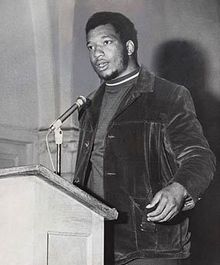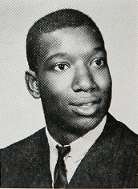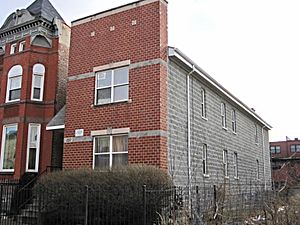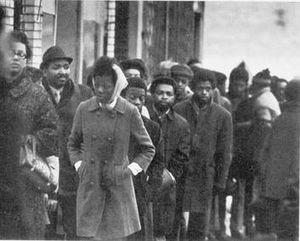Fred Hampton facts for kids
Quick facts for kids
Fred Hampton
|
|
|---|---|
 |
|
| Born |
Fredrick Allen Hampton
August 30, 1948 |
| Died | December 4, 1969 (aged 21) Chicago, Illinois, U.S.
|
| Cause of death | Assassination |
| Education | Triton College |
| Occupation | Activist, leader |
| Years active | 1966–1969 |
| Known for | Chairman of the Illinois chapter of the Black Panther Party |
| Political party | Black Panther |
| Partner(s) | Akua Njeri |
| Children | Fred |
Fredrick Allen Hampton Sr. (born August 30, 1948 – died December 4, 1969) was an American activist. He became well-known in Chicago as a leader of the Black Panther Party. He was the deputy chairman for the whole country and chairman of the Illinois chapter.
Fred Hampton was an African American who believed in fairness for everyone. He started the Rainbow Coalition. This group brought together different people to work for social change. It included the Black Panthers, the Young Patriots Organization (who organized poor white people), and the Young Lords (who organized Hispanic people). He also helped Chicago street gangs stop fighting each other. He wanted them to work together for a better community.
Fred Hampton believed that everyone should be treated equally. He often said, "nothing is more important than stopping fascism, because fascism will stop us all.”
Contents
Fred Hampton's Life
Early Years and Growing Up
Fred Hampton was born on August 30, 1948, in Summit Argo, Illinois. When he was 10, his family moved to Maywood, Illinois. His parents had moved from Louisiana as part of the Great Migration. This was when many African Americans moved from the South to other parts of the U.S.
Fred was a smart kid and good at sports. He dreamed of playing baseball for the New York Yankees. Even as a child, he cared about fairness. When he was 10, he started cooking breakfast for other kids in his neighborhood on weekends. This was like a first step towards the Panthers' free breakfast program later on.
In high school, he led protests for fairness. For example, he protested when black students were not allowed to compete for homecoming queen. He also asked for more black teachers and school leaders. Fred graduated from Proviso East High School with honors in 1966. He then went to Triton Junior College to study law. He wanted to understand laws to help protect people from police unfairness.
In 1966, Fred Hampton turned 18. He started learning about leaders like Che Guevara, Ho Chi Minh, and Mao Zedong. He also spoke out against the Vietnam War.
Fred Hampton became active in the National Association for the Advancement of Colored People (NAACP). He became a leader of their youth group in his area. He was a natural leader. In a town of 27,000 people, he built a youth group with 500 members. He worked to get better places for kids to play and better schools for the black community in Maywood.
Becoming an Activist in Chicago
Around the time Fred Hampton was leading the NAACP youth group, the Black Panther Party (BPP) was becoming well-known. Fred was drawn to the Black Panthers' ideas. They had a Ten-Point Program that focused on black people having control over their own lives. It also looked at problems with money and social classes.
Fred joined the Black Panther Party and moved to Chicago. In November 1968, he joined the Illinois chapter of the party. This chapter was started in 1967 by Bob Brown.
In 1968, Fred Hampton was accused of taking ice cream bars from a truck and giving them to kids. He was found guilty in May 1969 and sentenced to prison. Some people believe these were unfair charges meant to stop the Black Panthers.
By 1969, Fred Hampton was a top leader in the Illinois Black Panther Party. He held a meeting to speak out against sexism. After 1969, the party believed that sexism was wrong. By 1970, many women were members of the party.
Over the next year, Fred Hampton and his friends did many important things in Chicago. One of the most important was getting Chicago's powerful street gangs to agree not to fight each other. Fred explained that fighting among gangs only kept their members poor. He worked to create a group that included different races and social classes. This group was called the Rainbow Coalition. It included the Black Panthers, the Young Patriots Organization, and the Young Lords.
The Rainbow Coalition grew to include other groups across the country. These included Students for a Democratic Society (SDS), the Brown Berets, AIM, and the Red Guard Party. In May 1969, Fred Hampton announced that the coalition had formed. These groups worked together on common problems. Some of their shared goals were fighting poverty, racism, and police unfairness. They also worked for better housing. If there was a protest, all the groups would support each other.
Fred Hampton quickly became a top leader in the Black Panthers. This was because of his strong organizing skills and his powerful speeches. As the leader of the Chicago chapter, he held weekly meetings. He also helped with strikes and worked with the BPP's local health clinic. He taught political education classes every morning. He also started a project where community members watched the police to prevent unfairness. Fred Hampton was also very important in starting the BPP's Free Breakfast Program for children.
When other leaders left the party, Fred Hampton became the chairman of the Illinois Black Panther Party. This also made him a national deputy chairman. As the Federal Bureau of Investigation (FBI) tried to weaken the Panther leadership, Fred Hampton became even more important. He was in line to become a very high-ranking leader in the party.
Fred Hampton's Death
In 1967, the Federal Bureau of Investigation (FBI) saw Fred Hampton as a threat. They tried to stop his work in Chicago. In December 1969, Fred Hampton was killed in his Chicago apartment. This was done by a special police unit from Cook County. The Chicago Police Department and the FBI helped them before the attack.
After His Death
Over 5,000 people went to Fred Hampton's funeral. Important black leaders spoke at his funeral. These included Jesse Jackson and Ralph Abernathy. Ralph Abernathy took over from Martin Luther King Jr. as the head of the Southern Christian Leadership Conference.
A special jury did not charge anyone involved in planning or carrying out the raid.
Personal Life
Fred Hampton was very close with a Catholic priest named George Clements. Father Clements was his mentor and helped the local Panther group. Fred Hampton and the Panthers also used Father Clements's church, Holy Angels Catholic Church, as a safe place. This was especially true when the police were watching them closely. They also helped keep Father Clements's "Black Unity Masses" safe. These were part of his work during the Black Catholic Movement. Father Clements spoke at Fred Hampton's funeral. He also held a special church service for him at Holy Angels.
Legacy
In 1990, the Chicago City Council voted to name December 4, 2004, as Fred Hampton Day in Chicago.
Monuments and Streets
- A public swimming pool in his hometown of Maywood, Illinois, was named in his honor.
- On September 7, 2007, a statue of Fred Hampton was put up outside the Fred Hampton Family Aquatic Center in Maywood.
In March 2006, people who supported Fred Hampton's community work wanted to name a street in Chicago after him. However, the Chicago police union did not agree with this idea.
See also
 In Spanish: Fred Hampton para niños
In Spanish: Fred Hampton para niños
 | Jackie Robinson |
 | Jack Johnson |
 | Althea Gibson |
 | Arthur Ashe |
 | Muhammad Ali |




